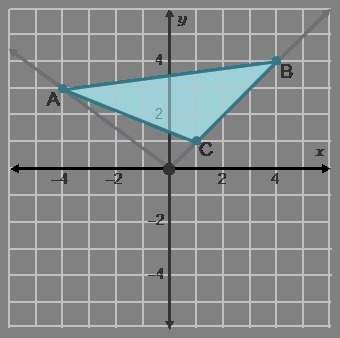
Mathematics, 31.08.2019 06:50 QueenB7591
Ahas the coordinates (–4, 3) and b has the coordinates (4, 4). if do,1/2(x, y) is a dilation of △abc, what is true about the image △a'b'c'? check all that apply.
ab is parallel to a'b'.
do,1/2(x, y) = (1/2x, 1/2y)
the distance from a' to the origin is half the distance from a to the origin.
the vertices of the image are farther from the origin than those of the pre-image.
a'b' is greater than ab.


Answers: 2


Another question on Mathematics


Mathematics, 21.06.2019 22:50
1. if events a and b are non-overlapping events, how do you find the probability that one or the other occurs? 2. what does it mean if p(a or b) equals 1?
Answers: 2


Mathematics, 22.06.2019 00:30
Fixed rate mortgage offer: purchase price: $170,000 down payment ($34k): 20% term: 30 years interest rate: 4.25% property tax (yearly): $1,500 homeowner’s insurance (yearly): $1,000 use this example from a fixed-rate mortgage calculator to you answer the questions. keep the page open after you complete this question. according to the calculator, the monthly payment demarco and tanya should anticipate paying for principal and interest is $208. $877. $669. $1,200.
Answers: 1
You know the right answer?
Ahas the coordinates (–4, 3) and b has the coordinates (4, 4). if do,1/2(x, y) is a dilation of △abc...
Questions








Biology, 04.09.2019 03:30

History, 04.09.2019 03:30


English, 04.09.2019 03:30









 , with center O and a scale factor of k that is not zero, that maps O to itself and any other point P to P'.
The center O is a fixed point, P' is the image of P, points O, P and P' are on the same line.
, with center O and a scale factor of k that is not zero, that maps O to itself and any other point P to P'.
The center O is a fixed point, P' is the image of P, points O, P and P' are on the same line. , the scale factor,
, the scale factor,  is mapping the original figure to the image in such a way that the
distances from O to the vertices of the image are half the distances
from O to the original figure. Also the size of the image is half the
size of the original figure.
is mapping the original figure to the image in such a way that the
distances from O to the vertices of the image are half the distances
from O to the original figure. Also the size of the image is half the
size of the original figure.


